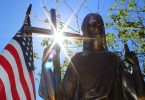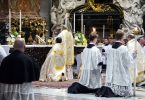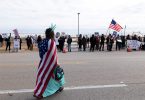by Dennis Sadowski
WASHINGTON (CNS) — An official of the New York State Catholic Conference expressed disappointment with a June 23 U.S. Supreme Court ruling that overturns a century-old law and asserts that there is a constitutional right to carry a handgun in public for self-defense.
“We are troubled that the court has overturned a law dating back more than a century that has been largely accepted by the state’s population for all of that time,” said Dennis Poust, executive director of the conference, which represents the New York bishops on public policy matters.
“The duly-elected members of the state Legislature could have at any time over the past 110 years revisit its policies on how it licenses individuals for the purpose of carrying concealed handguns outside the home if it was the will of the citizens of the state. It’s regrettable that the U.S. Supreme Court has now chosen to step in to do so,” Poust said in a statement.
The court voted 6-3 to strike down the New York law requiring anyone who wants to carry a concealed weapon for self-defense to demonstrate a specific need for doing so.
Legal experts said the decision puts at risk similar laws in five other states: California, Hawaii, Maryland, Massachusetts and New Jersey.
The court’s ruling follows recent mass shootings in Uvalde, Texas; Buffalo, New York; and elsewhere in which dozens of children and adults have been killed or injured. The incidents have led to an outcry of support for wide-ranging gun control measures.
Writing for the court’s conservative majority, Justice Clarence Thomas referred to an earlier court ruling while explaining that “the constitutional right to bear arms in public for self defense is not ‘a second-class right, subject to an entirely different body of rules than the other Bill of Rights guarantees.’
“We know of no other constitutional right that an individual may exercise only after demonstrating to government officers some special need. That is not how the First Amendment works when it comes to unpopular speech or the free exercise of religion. It is not how the Sixth Amendment works when it comes to a defendant’s right to confront the witnesses against him. And it is not how the Second Amendment works when it comes to public carry for self defense,” Thomas wrote in the 66-page opinion.
Hours after the Supreme Court’s issued its ruling, the Senate passed the first significant new gun restrictions since the mid-1990s. The Bipartisan Safer Communities Act was approved 65-33, with 15 Republican senators joining all 50 Democratic senators to pass the legislation.
A vote was set for June 24 in the House of Representatives, where it was expected to pass as well. President Joe Biden pledged to sign the bill as soon as it reached his desk.
“This bipartisan legislation will help protect Americans. Kids in schools and communities will be safer because of it,” Biden said in a statement released by the White House after the Senate vote.
The chairmen of four U.S. Conference of Catholic Bishops committees sent another letter to members of Congress June 23 calling for passage of the bill. It was the second such letter in June from the chairmen urging the adoption of “reasonable gun control measures.”
The letter was signed by Archbishop Paul S. Coakley of Oklahoma City, chairman of the Committee on Domestic Justice and Human Development; Archbishop Salvatore J. Cordileone of San Francisco, chairman of the Committee on Laity, Marriage, Family Life and Youth; Archbishop William E. Lori of Baltimore, chairman of the Committee on Pro-Life Activities; and Bishop Thomas A. Daly of Spokane, Washington, chairman of the Committee on Catholic Education.
The bill calls for expanded criminal background checks for some gun buyers, blocks more domestic violence offenders from purchasing firearms, funds programs for local authorities to confiscate guns from troubled individuals, and provides $15 billion for mental health services and school security measures.
The court’s three liberal members voted to uphold the New York law. In a dissenting opinion, Justice Stephen Breyer noted that more than 270 mass shootings have occurred since January and that data shows gun violence is now the leading cause of death of children and teenagers.
The majority ruling will make it more difficult for state legislators to act to prevent gun violence, Breyer wrote in an opinion joined by Justices Sonia Sotomayor and Elena Kagan.
The New York bishops, Poust said, welcomed Justice Samuel Alito’s concurring opinion that the court’s ruling “decides nothing about who may lawfully possess a firearm or the requirements that must be met to buy a gun,” nor does it “decide anything about the kinds of weapons that people may possess.”
Poust added that “this decision does not appear to slam the door in any way on licensing requirements, age restrictions or assault weapons bans.”
He also reiterated that the New York bishops “support reasonable gun laws to address street crimes, domestic violence, suicide and mass shootings.”
“We are happy to support efforts by Gov. Kathy Hochul and the Legislature to pass new legislation that will meet constitutional muster with the Supreme Court,” Poust said.






